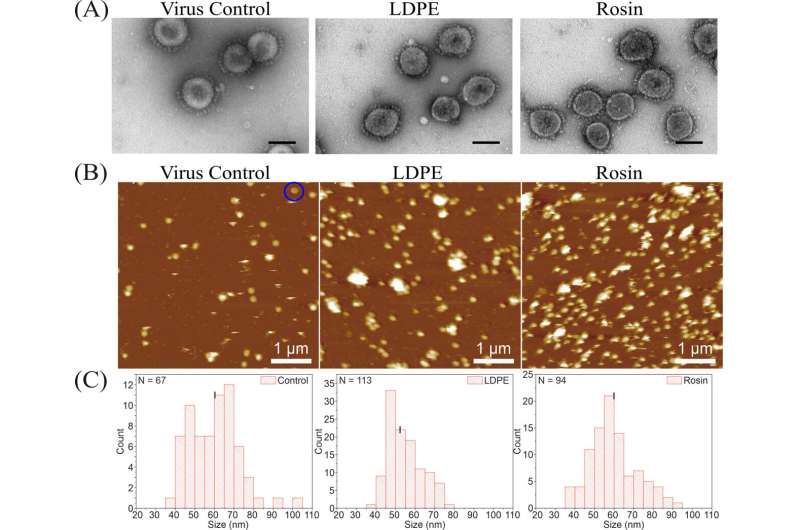Research finds resin that destroys coronavirus on plastic surfaces
Originally published by University of Jyväskylä, on January 30, 2024
 Studying
the impact of rosin-functionalized plastic and standard LDPE on the structure
of HCoV-OC43 using (A) TEM and (B) AFM in liquid. The scale bar corresponds to
100 nm and 1 µm in the TEM and AFM images, respectively. In panel B, the blue
circle highlights a doughnut-shaped virus. (C) The histogram derived from the
AFM images illustrates the average size distribution of the height of
individual viruses after being flushed from their respective surfaces. Credit:
Microbiology Spectrum (2024). DOI: 10.1128/spectrum.03008-23
Studying
the impact of rosin-functionalized plastic and standard LDPE on the structure
of HCoV-OC43 using (A) TEM and (B) AFM in liquid. The scale bar corresponds to
100 nm and 1 µm in the TEM and AFM images, respectively. In panel B, the blue
circle highlights a doughnut-shaped virus. (C) The histogram derived from the
AFM images illustrates the average size distribution of the height of
individual viruses after being flushed from their respective surfaces. Credit:
Microbiology Spectrum (2024). DOI: 10.1128/spectrum.03008-23Researchers at the University of Jyväskylä, Finland, are currently developing anti-viral surfaces to decrease the spread of infectious diseases. A recent study published in Microbiology Spectrum found that a resin ingredient is effective against coronaviruses and strongly decreases their infectivity on plastic surfaces.
Viruses may persist on solid surfaces for long periods, which may contribute to an increased risk for infection. The research group of the Professor of Cell and Molecular Biology Varpu Marjomäki from the University of Jyväskylä, is investigating how different surfaces and materials could decrease the spread of viral diseases. For example, they are studying how long corona viruses survive on different surfaces when humidity and temperature are varying.


Comments
Post a Comment